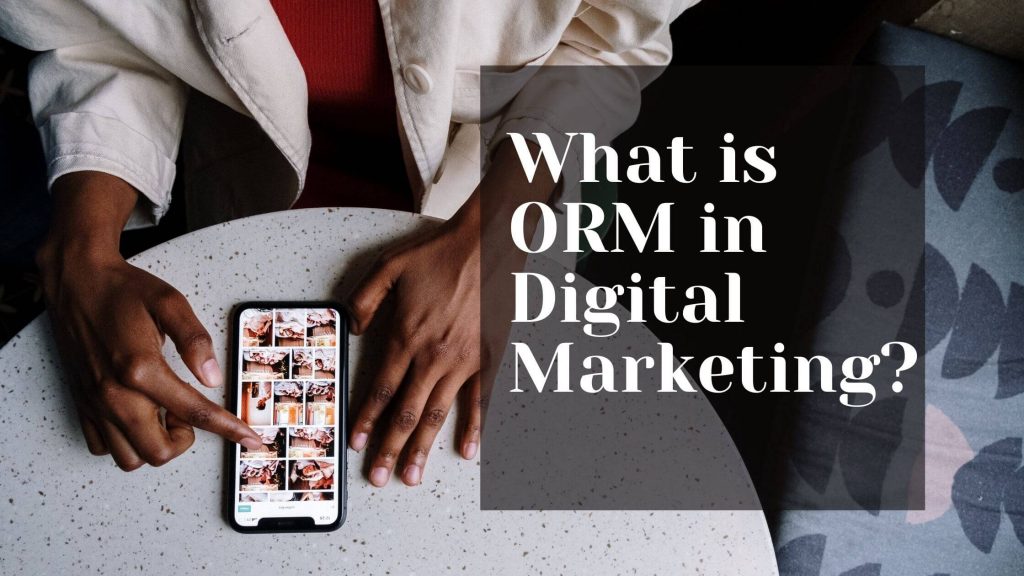One of the most effective ways to maintain or develop your company’s brand outside of the internet community is online reputation management (ORM). Search engines, Twitter, forums, blogs, social networks, and other forms of online communication are all part of the online community. It is essential to be present on these platforms to increase your brand’s value and increase your exposure reasonably.
What is ORM in digital marketing? Here is all about it.

What is ORM?
ORM is an acronym that stands for Online Reputation Management. Generally speaking, search engine optimization is focused on improving a website’s ranking for a product or service-related search keywords. ORM is a method that utilizes search engine optimization (SEO) and several other tactics to enhance a brand’s overall image. Both are subcategories of the larger field of internet marketing.
Businesses and individuals have used search engine optimization (SEO) methods to enhance their search engine page ranks for more than two decades. In the late 1990s, it became apparent that the best location for your website to appear was on the first page of search results, thus kicking off the never-ending fight for page rankings that continues to this day. In today’s world, the battle continues, impacting both online and offline companies equally.
Importance of ORM
The Importance of Online Reputation Management (ORM) in Digital Marketing
- Increase the effectiveness of your Search Engine Optimization. Because SEO affects search engine rankings
- Improve brand exposure: Online reputation management (ORM) assists you in enhancing customer feedback about your brand and increasing brand visibility.
- Increased Sales: People are more drawn to a business that has received more good evaluations, which helps to boost the amount of money that your firm makes.
The Importance of Online Reputation Management (ORM) in Business
- Creating a persona and working to improve it day by day is the goal of life. For example, when most transactions are completed online, it is critical to ensure that your brand is easily identifiable. When establishing a new company, it is equally essential to maintain one’s good reputation.
- The search results heavily influence the tastes of the individuals. Before purchasing any goods, consumers read online content to learn more about the business and customer reviews. If consumers come across a bad review about a specific brand, they will avoid that particular brand.
- Feedback about you may be left by anybody on the internet, even rivals who do so consciously to harm your online reputation.
- Good content is advantageous to a company’s bottom line. By using online reputation management (ORM) services, you will be able to remove harmful material and improve the overall performance of your company.
What is ORM, and how does it work?
When it comes to online reputation management ( ORM ), it’s all about making sure your company is correctly portrayed, and prospective consumers have a positive image of you and what you do.
Using Paid Media to Manage Your Online Reputation
Paid media encompasses any internet material you must pay to get your business included (website, services, etc.). Influencer marketing is a mix of paid and unpaid methods of promoting a product or service.
Media that is shared
In addition to your website, your company’s profiles on different social media platforms serve as the online equivalent of your business card. If you don’t respond to consumer concerns or respond negatively on social media, your company’s image will suffer, and prospective customers will get disinterested. Additionally, you must keep track of any brand references that appear in other accounts and take action against any detrimental comments to your company’s reputation.
Media that has been acquired rather than given
When you talk about earned media, you’re referring to the free publicity your company gets from third-party sources. They are as follows:
- Articles from other sources,
- Publicity in the media
- The use of blogs and video blogs
Certain third-party listings are unique to the industry Customers submit evaluations for your company on Google My Business, which counts as earned media. There are several benefits to focusing on earned media, including a more optimistic attitude and building trust with your online audience.
ORM Tools are available in a variety of forms.
Data conversion between object-oriented programming languages with incompatible type systems is accomplished using object-relational mapping programming techniques. The object-relational mapping may be performed using free and paid programs, but some programmers prefer to build their ORM tools from scratch.
Google Alerts
One of the many free tools available to marketers and SEO experts is Google Alerts. Google Alerts is one of the most useful of these tools. Simply input your business name, in the same manner, you would enter keywords in your specialty for which you would want to get notifications.
SEMrush
SEMrush enables you to monitor internet mentions, as well as sentiment ratings and resource authority, to identify potential problems.SEMrush may be used to keep track of your online reputation.SEMrush provides a limited amount of free use. However, it is a component of the whole SEMrush package.
Reputology
Known as a review management and monitoring tool, Reputology assists multi-location companies in tracking down and managing negative reviews. Additionally, industry-specific review sites like the hotel, dining, healthcare, fitness, and real estate sectors allow you to “listen” to what consumers are saying about your place in addition to social networking sites.
RankRanger
RankRanger is a widely used SEO tool, but it also has a robust reputation management feature. This tool enables you to examine search engine results for threatening or defamatory material, as well as monitor changes in search engine results pages (SERPs) and the effect of your reputation management efforts on your overall visibility.
Conclusion
Understanding the fundamentals of new technology is often boiled down to grasping a few basic ideas. This means that ORM is no different from other technologies in this situation. A hazardous degree of talent depletion is being reached at this point. The distinction between entity and value types is a fundamental notion in object-relational modeling. Only when you have gained an understanding of these concepts can you begin to build successful ORM solutions.
Your issue domain probably has many instances of entity and value types in their various forms. Another critical concept to grasp is the connection between your ORM Java code and the final database structure. This is the link that connects the worlds of Java with relational database technologies.

